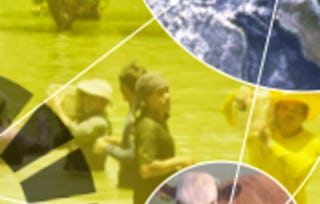Ideas and imaginaries inspire human capacity for great endeavours, but ‘conventional wisdom’ frequently prevents necessary change. Achievement of global sustainable development is, therefore, dependent on a profound comprehension of the preunderstandings and implicit imaginaries that form both our perception of reality and our basic confidence in the viability of transgressive action.

Sustainable Development - Ideas and Imaginaries
3 days left! Gain next-level skills with Coursera Plus for $199 (regularly $399). Save now.

Sustainable Development - Ideas and Imaginaries

Instructor: Bo Fritzbøger
4,370 already enrolled
Included with
(47 reviews)
Skills you'll gain
Details to know

Add to your LinkedIn profile
4 assignments
See how employees at top companies are mastering in-demand skills

There are 4 modules in this course
This module will introduce you to those historical processes that joined environmentalism and developmentalism into the concept ‘sustainable development’, and to the challenges emerging from the encounter of physical planetary boundaries with social limits to human livelihood.
What's included
3 videos1 reading1 assignment1 discussion prompt
This module will introduce you to a variety of ideas about where sustainable solutions are going to come from by focusing e.g. on constituent based regulative political decision-making vs. the aggregate economic power of multifarious individual consumer choices, and on the ideals of universal human rights.
What's included
2 videos1 reading1 assignment1 discussion prompt
This module centres on various interpretations of human relations to nature, to attaining knowledge about nature, and to some ethical considerations pertinent when interacting with other biological species.
What's included
2 videos1 reading1 assignment1 discussion prompt
This module presents some prevalent ideas about time and change while focusing specifically on the history of post-colonial developmentalism, the political hegemony of universally infinite economic growth, and the supposed transition from a linear to an exponential time regime.
What's included
3 videos1 reading1 assignment1 discussion prompt
Instructor

Offered by
Explore more from History
 Status: Preview
Status: PreviewLund University
 Status: Preview
Status: PreviewUniversity of Copenhagen
 Status: Preview
Status: PreviewYonsei University
 Status: Preview
Status: Preview
Why people choose Coursera for their career

Felipe M.

Jennifer J.

Larry W.

Chaitanya A.
Learner reviews
- 5 stars
78.72%
- 4 stars
17.02%
- 3 stars
2.12%
- 2 stars
0%
- 1 star
2.12%
Showing 3 of 47
Reviewed on Jul 11, 2023
Excellent, but there should be the name of the learner.
Reviewed on Jul 24, 2023
Clearly structured and resumed to the essential. The right balance between different views to promote critical thinking. A good example in the art of thinking. Congratulation.
Frequently asked questions
To access the course materials, assignments and to earn a Certificate, you will need to purchase the Certificate experience when you enroll in a course. You can try a Free Trial instead, or apply for Financial Aid. The course may offer 'Full Course, No Certificate' instead. This option lets you see all course materials, submit required assessments, and get a final grade. This also means that you will not be able to purchase a Certificate experience.
When you purchase a Certificate you get access to all course materials, including graded assignments. Upon completing the course, your electronic Certificate will be added to your Accomplishments page - from there, you can print your Certificate or add it to your LinkedIn profile.
Yes. In select learning programs, you can apply for financial aid or a scholarship if you can’t afford the enrollment fee. If fin aid or scholarship is available for your learning program selection, you’ll find a link to apply on the description page.
More questions
Financial aid available,





